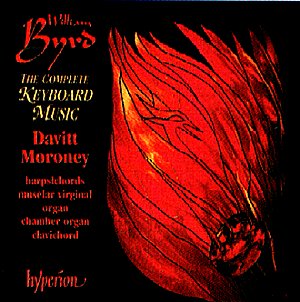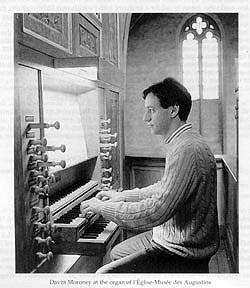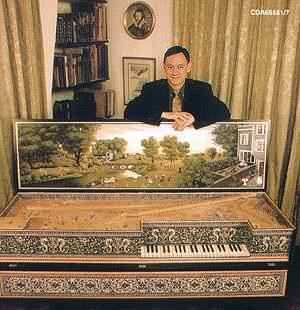
Indeed, this is one of the greatest projects ever! Davitt Moroney has long
been hailed as the greatest Byrd expert and his vast knowledge has finally
been preserved for all in this magnificent seven-disc set that personifies
the grandeur and all embracing mastery of this mystical English composer.
Browsing through the mammoth 45,000-word booklet takes one's breath away,
let alone practicing, rehearsing, editing and recording all the 137 pieces,
surely Moroney must be superhuman! Still his matter-of-fact way of recounting
all these tasks seems almost like a labour of love, as indeed it must be
for such care and affection to be lavished on such a daunting project.
One may have gathered that this is indeed a library choice so any further
comments would be a bit superfluous. Not so, however. Moroney's way with
the music provokes debate and his multifarious use of various instruments
should start a whole host of new recordings, after all competition is indeed
healthy. Of the seven discs (available for the price of five), only two are
below the hour whilst the other five are well over seventy minutes, surely
value for money is indeed a keyword here. The various instruments used (too
many to mention here) all sound wonderful especially the ubiquitous muselar,
surely a museum piece nowadays.[picture below]
I will restrict myself to mentioning a few favorites but I will say straightaway
that almost all the pieces have beauty and an unrestrained amount of invention
packed between the notes. Indeed the first discs contains that wonderful
'Lord Willobies Welcome Home', a delightful party piece whilst the
'Lesson of Voluntaries' shows Byrd's skill at combining the best
traditions of his day with outstanding forward reaching thought. 'The
Carman's Whistle' is another beautiful work with the sonorities of the
chamber organ explored whilst the nine minute 'Second Ground' shows
Byrd's versatility in this mode.
The second disc explores shorter harpsichord and muselar pieces. The sound
gets a bit tedious after a while but there is no denying the genius in the
short 'Preludium' and the lengthy "Have with yow to Walsingame'.
Moroney's treatment of 'Jhon kisse me now' recalls the importance
of this traditional melody, skillfully transformed by Byrd''s contrapuntal
facility. With the third CD, we go on to organ territory (a personal favourite)
and some of the finest works in the collection. Who could fail to be moved
by the splendid 'Voluntarie' or the simple mysticism of the
'Clarifica me pater' pieces, sure testimonials to Byrd's unswinging
Catholic faith. Moroney makes the transition from muselar to organ with
remarkable dexterity; his fingers almost sweep along the Toulouse organ.
If there were one disc from the seven that I would go into red-hot embers
for, than it would have to be this!
Number 4 is similarly enticing although one of the shortest. A beautiful
'Fantasia' is matched by the usual folk tune arrangements, the best
of which is the opening 'Will you walke the woods so wylde'. Spiritual
harmony pervades 'O quam gloriosum est regnam', another mysterious
work whilst the chirpy 'The Hunt's Up' recalls the pleasures of medieval
fox hunting! The fifth discs also contains much beautiful music especially
in the various short Galliards and Pavanes that permeate it with some
breathtaking playing by Moroney. Short pieces also fill the sixth discs which
also reaches 78 minutes like its predecessor. I would advise taking these
two discs in small doses as the constant sound of 'skeletons in the closet'
(vintage Beecham) may occasionally unnerve your ears.
Seven concludes the collection in style. By far the most impressive piece
in this collection is the epic twelve minute 'The Battell', a wonderful
work, surely one of Byrd's finest masterpieces in this genre. There are a
number of Paven's dedicated to noble patrons, no doubt Byrd's tribute to
these important figures whilst four versions of the 'Praeludium to a
Fancy' had me tickled pink comparing and replaying!
Obviously no sort of detailed explanation will do this set justice. It is
rather like trying to review the 'Encylopedia Brittanica'. All recordings
are marvelously vivid and alive and the presentation is beautiful with parchment
like slipcases and a handy cardboard box. The scholarly text is a must for
all to read and enjoy the detail, whilst notes on each separate instrument
used are also provided. A must choice for all keyboard enthusiasts and perhaps
the dawning of a new interest into the timeless music of William Byrd.
Reviewer
Gerald Fenech
Performance:

Sound:

and Peter Grahame Woolf adds
A personal note in endorsement of Gerald Fenech's comprehensive review and
suitably fulsome recommendation. In a period of intégrales (complete
recordings on CD) no one before Davitt Moroney has thought to tackle the
vast corpus of William Byrd's keyboard music. Until recently its sustained
quality and originality has not been widely recognised. Perhaps prolificity,
rather than being thought a virtue, has always been suspect and tended to
put people off (think of some from our own time that come to mind, e.g. Martinu,
Milhaud & Hovhaness)?
 Davitt Moroney has loved this music for thirty years, and his boxed
set, recorded 1991/2 and 1996/7 on harpsichords, organs, virginal and clavichord,
is a wonderful culmination of that devotion. For closer to fifty years, I
have enjoyed playing Byrd's keyboard music regularly on my Hodsdon clavichord,
made for me in Lavenham in 1951. (Alec Hodsdon's wife Margaret was a leading
virginalist of the time, specialising in Elizabethan music.) Several of the
pieces have remained amongst my constant favourites. They go well on the
clavichord, but need there fewer ornaments (just as well, because I cannot
get my fingers around the elaborate ornaments which constantly enliven Moroney's
performances). Davitt Moroney plays a few of the pieces on a 1972 Thomas
Goff clavichord; 4 octaves, double strung "after German models". His finely
crafted and beautifully decorated instruments were favoured in the 60s. With
the rage for authenticity they became unfashionable, but now are being seriously
re-explored by the British Clavichord Society.
Davitt Moroney has loved this music for thirty years, and his boxed
set, recorded 1991/2 and 1996/7 on harpsichords, organs, virginal and clavichord,
is a wonderful culmination of that devotion. For closer to fifty years, I
have enjoyed playing Byrd's keyboard music regularly on my Hodsdon clavichord,
made for me in Lavenham in 1951. (Alec Hodsdon's wife Margaret was a leading
virginalist of the time, specialising in Elizabethan music.) Several of the
pieces have remained amongst my constant favourites. They go well on the
clavichord, but need there fewer ornaments (just as well, because I cannot
get my fingers around the elaborate ornaments which constantly enliven Moroney's
performances). Davitt Moroney plays a few of the pieces on a 1972 Thomas
Goff clavichord; 4 octaves, double strung "after German models". His finely
crafted and beautifully decorated instruments were favoured in the 60s. With
the rage for authenticity they became unfashionable, but now are being seriously
re-explored by the British Clavichord Society.
I used to hear Thurston Dart and George Malcolm play them, and exquisite
they were to see and hear. They also 'cracked' the difficult problem of recording
and broadcasting the quietest of instruments, bedevilled by ambient noise.
At concerts, Thomas Goff always hovered around, nursing his precious instruments
and ensuring that discreet microphone enhancement was never allowed to degenerate
into distorting amplification (a lesson still unlearnt in many concert
contexts!).
All credit that the clavichord's extreme quietness, which comes as quite
a shock after the other instruments used, is not falsified in Moroney's
recording. Those other instruments include two harpsichords and two organs;
none of them actually based upon instruments of Byrd's time. But since this
does not worry a specialist like Clifford Bartlett (Editor of Early Music
Review) it need not trouble general music lovers who study Music on the Web's
reviews, and it certainly doesn't disturb me!
 I too was especially taken by the sweet toned Muselar Virginal
by John Phillips, 1991, after a Flemish instrument of 1679. Its keyboard
is placed on the right which, by enabling the strings to be plucked in the
middle of their sounding length, creates a rich, full sound. This beautiful
instrument is illustrated in colour on the back cover of the 100 page booklet
(another 100 in French!) of notes and essays with the seven CDs, as thorough
and learned exposition of the subject as we are likely to see. There are
many black and white (gray, rather, sometimes) illustrations of considerable
interest, but they are not indexed. The listing of items in the Disc 7 slipcase
has gone awry, but it is correct in the booklet.
I too was especially taken by the sweet toned Muselar Virginal
by John Phillips, 1991, after a Flemish instrument of 1679. Its keyboard
is placed on the right which, by enabling the strings to be plucked in the
middle of their sounding length, creates a rich, full sound. This beautiful
instrument is illustrated in colour on the back cover of the 100 page booklet
(another 100 in French!) of notes and essays with the seven CDs, as thorough
and learned exposition of the subject as we are likely to see. There are
many black and white (gray, rather, sometimes) illustrations of considerable
interest, but they are not indexed. The listing of items in the Disc 7 slipcase
has gone awry, but it is correct in the booklet.
The performances are alive and remain alert, rhythmically buoyant and full
of fancy throughout 500 minutes of music, the culmination of "over thirty
years living with and loving" William Byrd's keyboard music.
This mammoth achievement is well worth considering for a Christmas present
(or self-indulgence). At £60 from Lindum Records (fax 01522 527530 or
Email: peter@aldhund.demon.co.uk) it is quite a bargain.
Peter Grahame Woolf

